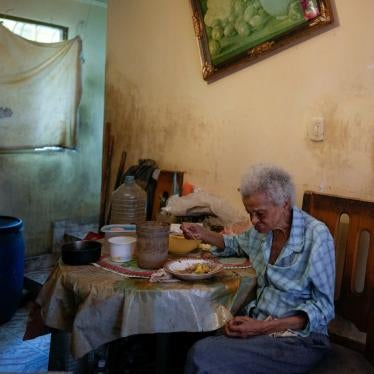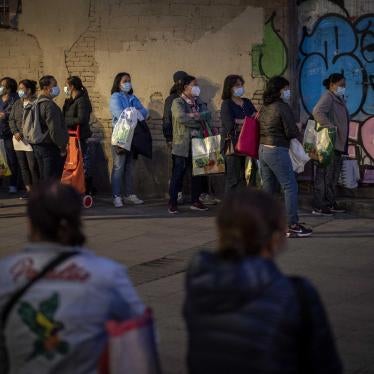February 20, 2023
Question 1: Definition
Introduction
This submission on the normative content of rights pertinent to older people’s economic security focuses on the right to social security in relation to adequacy, and the right to an adequate standard of living in relation to food and housing. It is grounded in Human Rights Watch’s research on the rights of older people, including in Canada, Spain, South Africa and Russia.
A. Right to Social Security: Adequacy
1. Definition
Older persons have the right to social security without discrimination based on age, gender, or any other ground, so they can live with dignity and fully participate in society.[1]
2. Adequacy
Older persons have the right to social security measures, whether in cash or kind, that are of a high enough value, quantity and quality, and for the full period of life, for an adequate standard of living and so that they can live autonomous, independent lives with dignity and can fully participate in society.[2]
Rationale:
According to the UN Committee on Economic, Social and Cultural Rights, states parties to the ICESCR are obligated to provide a minimum level of protection for all those who need it and then progressively realize universal coverage and adequate levels of benefits over time.[3] This includes casual, part-time, self-employed or other workers not adequately protected by social security schemes, informal sector workers who have not contributed to formal employment-related social security schemes, Indigenous peoples and minority groups, non-nationals, including migrant workers, refugees, asylum seekers and stateless persons, and internal migrants and displaced people.[4]
Benefits, whether in cash, for example pensions, or in kind, for example care and support services, should be adequate in amount and duration and the adequacy criteria monitored regularly to ensure that beneficiaries are able to access or afford the goods and services they require to realize their fundamental rights.[5] Fiscal consolidation or other measures that reduce the real value of social security entitlements are likely to be regressive and as such would be a violation of the right.
3. State Measures: Adequacy
States should take steps to ensure that social security measures, whether in cash or kind, are of a high enough value, quantity and quality, and for the full period of life, for an adequate standard of living and so that older persons can live autonomous, independent lives with dignity and can fully participate in society.
These include:
- Reviewing and reassessing if existing rates of social security support, including pensions whether contributory or non-contributory, are sufficient to:
- guarantee the right to an adequate standard of living;
- ensure that no older person in receipt of such social security support or their dependents are left in a situation where they are unable to afford sufficient and nutritious food, adequate housing, clothing, and care and support services so they can live with dignity;
- Adjusting social security support rates to cost-of-living indices, including the cost of food, utilities and transport.
B. Right to an Adequate Standard of Living: Food and Housing
1. Definition
Older persons have the right to an adequate standard of living, including adequate food, clothing, housing, and to the continuous improvement of living conditions, without discrimination on the basis of age or any other ground.[6]
2. Food and Housing
2.1 Food
Older persons have the right to adequate affordable, accessible, culturally acceptable and nutritious food and which satisfies their dietary needs. Older persons have the right to exercise their autonomy and choice over the food that they eat and the time at which they eat it, particularly those in receipt of care and support services.
Rationale:
An adequate standard of living goes beyond meeting basic survival needs. According to the UN Committee on Economic, Social and Cultural Rights, the right to adequate food should “not be interpreted in a narrow or restrictive sense which equates it with a minimum package of calories, proteins and other specific nutrients.” [7] While the right to adequate food is a right realized progressively, states parties have “a core obligation to take the necessary action to mitigate and alleviate hunger,” even during natural or other disasters.[8]
2.2 Housing
Older persons have the right to adequate, affordable, quality, appropriate and accessible housing designed to accommodate their requirements, and which can be adapted to their changing capacities.
Rationale:
The UN Committee on Economic, Social and Cultural Rights determined older persons are among those who should be given priority for housing and whose “special housing needs” should be taken into account.[9]
The UN Independent Expert on the enjoyment of all human rights by older persons concluded that states should improve the affordability of housing for older people, including by reevaluating their pensions and allowing them to work after retirement age; eliminating discrimination on the basis of age and other grounds in all housing-related laws, policies, and practices; providing housing adapted to the needs and rights of older persons; and providing a range of care and support services that promote their dignity, autonomy, and independence and enable them to remain in their home.[10]
3. State Measures
3.1 Food
States should take measures to ensure that:
- Existing rates of social security support, including pensions, are sufficient to guarantee the right to food as part of an adequate standard of living.
3.2 Housing
States should take measures to ensure that:
- Existing rates of social security support, including pensions, are sufficient to guarantee the right to housing as part of an adequate standard of living.
- Older persons have access to:
- Public housing, subsidies and access to land programs that take into account their specific needs without discrimination on the basis of their age or other grounds;
- A range of in-home and community support services to enable them to live in their own home, should they choose to;
- Home loans and other forms of financing, without discrimination of any kind, including on the basis of their age; and
- Architecturally suitable and accessible housing for older persons.
[1] Older people have the right to social security under the International Covenant on Economic, Social and Cultural Rights (ICESCR); Convention on the Elimination of All Forms of Discrimination against Women (CEDAW), arts. 11 and 14; and Convention on the Rights of Persons with Disabilities (CRPD), art. 28. At the regional level, older persons right to social security is protected, for example, under the Inter-American Convention on the Human Rights of Older People (ICHROP), art. 17 and the European Social Charter (revised), art.23.
[2] See for example, CRPD, art. 28; Committee on Economic, Social and Cultural Rights, General Comment No. 19, 2008, para. 22.
[3] CESCR General Comment No. 19, “The Right to Social Security,” 2008, paras. 22, 59(a).
[4] CESCR General Comment No. 19, “The Right to Social Security,” 2008, paras. 33 - 39.
[5] CESCR, General Comment No. 19, “The Right to Social Security,” para. 22.
[6] Older persons have the right to an adequate standard of living under ICESCR, art. 11, including adequate food, clothing and housing, and continuous improvement of living conditions.
[7] CESCR, General Comment No. 12, “The Right to Adequate Food,” 1999, para. 6, citing ICESCR, art. 11.
[8] Ibid.
[9] CESCR, General Comment No. 4, “The Right to Adequate Housing,” 1991, para. 8(e).
[10] Independent Expert on the enjoyment of all human rights by older persons, “Older Persons and the Right to Adequate Housing,” A/77/239, July 19, 2022, paras. 93, 101, 105, 110-111, https://www.ohchr.org/en/documents/thematic-reports/a77239-older-persons-and-right-adequate-housing-note-secretary-general (accessed November 13, 2022).






